Dorothy Nyong’o, Zainab Shinkafi-Bagudu, and Deborah Harkness Join World Ovarian Cancer Coalition as First Global Ambassadors
African first ladies and esteemed historian partner to raise awareness of ovarian cancer and help improve access to better quality, affordable care
Ambassador Program launches ahead of World Ovarian Cancer Day on May 8
Toronto, Canada – April 25, 2023 – The World Ovarian Cancer Coalition (Coalition) today announced the organization’s first global Ambassadors to help close gaps in ovarian cancer outcomes: Dorothy Nyong’o, First Lady of Kisumu County, Kenya; Zainab Shinkafi-Bagudu, M.D., First Lady of Kebbi State, Nigeria; and Deborah Harkness, Ph.D., U.S.- and U.K.- based historian and New York Times bestselling author. In their roles as Ambassadors, Mrs. Nyong’o, Dr. Shinkafi-Bagudu, and Dr. Harkness will support the Coalition in its efforts to raise awareness of ovarian cancer, tackle low health literacy, and empower women across the world to take action to improve equitable access to high-quality, affordable care for ovarian cancer.
If the status quo is maintained, by 2040 an estimated 4 million women will be lost to ovarian cancer. The majority of women (70%)[i] with the disease live in low- and middle-income countries where access to basic medical care is severely limited by the lack of effective infrastructure, limited resources, geographic and cultural barriers. While those in high-income countries often fare better overall, women often experience delays in diagnosis and there is vast variation in care resulting in inconsistent availability, access to, and usage of genetic testing, diagnostics, and the latest treatment options.
“The need to make ovarian cancer a global priority is as urgent as ever. The gap between those who can access the best possible care and those who cannot is continuing to grow and will result in the tragic loss of millions more lives if we don’t take action now,” said Clara MacKay, CEO of the World Ovarian Cancer Coalition. “Mrs. Nyong’o, Dr. Shinkafi-Bagudu, and Dr. Harkness are inspirational, passionate leaders who share our vision of a world where every woman with ovarian cancer has the best chance of survival and best quality of life possible wherever she may live. We are proud to partner with them to lead this call for action, inform the debate, and help educate women around the world about ovarian cancer.”
The World Ovarian Cancer Coalition Ambassadors are:
- Her Excellency Mrs. Dorothy Nyong’o, Managing Trustee of Africa Cancer Foundation, First Lady of Kisumu County, and Director of 7th Sense Communications Limited. She holds an Executive M.Sc. in Organisational Development from the United States International University (Nairobi), a Postgraduate Diploma in Mass Communications, and a B.A. Hons in French and Political Science from the University of Nairobi.
- Her Excellency Dr. Zainab Shinkafi-Bagudu, a Consultant Paediatrician and an advocate for women’s health. With a particular focus on cancer, she is often referred to as the mother of health in her native land. In her role as the First Lady of Kebbi State, Dr. Shinkafi-Bagudu works with the state ministries of health, education, and women affairs to implement programmes to sustainably improve menstrual hygiene, girl-child education, and economic empowerment of women, and put an end to gender-based violence.
- Deborah Harkness, Ph.D., the New York Times and internationally bestselling author of the All Souls series and a professor of European History and the History of Science at the University of Southern California. Dr. Harkness is a well-regarded historian of science and medicine and the recipient of fellowships from the Guggenheim Foundation, the National Council of Learned Societies, the National Science Foundation, and the National Humanities Center. She holds a Ph.D. from the University of California, Davis, an M.A. from Northwestern University, and a B.A. from Mount Holyoke College, and studied at Oxford University.
The Ambassadors will be key to helping to further the Coalition’s mission to empower the global ovarian cancer community through collaboration, knowledge, and action. The launch of the Ambassador Program comes just ahead of World Ovarian Cancer Day, a flagship awareness-raising initiative in which approximately 200 organizations from around the world raise their voices in solidarity in the fight against ovarian cancer.
To learn more about the Coalition, please visit worldovariancancercoalition.org.
Quotes for Media
Her Excellency Mrs. Dorothy Nyong’o – “Sadly, there is a stigma around ovarian cancer for too many in the world, even in 2023, and that is compounded by many societal and economic barriers to health care, not just in my country, Kenya. As a founding trustee of Africa Cancer Foundation, I am excited to serve as an Ambassador so we can improve awareness and access for all women – no matter where they live.”
Her Excellency Dr. Zainab Shinkafi-Bagudu – “I believe that we must be our sisters’ keepers and that when we come together, great things can happen. Through my work at the Union for International Cancer Control, my own Medicaid Cancer Foundation and now as World Ovarian Cancer Coalition Ambassador, I hope to add to the global conversation in addressing the gaps in the continuum of care. Only through collaboration between advocates, policymakers, and private sector will we accelerate change.”
Deborah Harkness, Ph.D. – “While this is not a diagnosis anybody would choose, I am grateful to be here today as a survivor and World Ovarian Cancer Coalition Ambassador to raise awareness for this disease. If we do nothing to change the status quo, by 2040 over four million women worldwide will be lost to ovarian cancer. It is crucial that we be advocates for our health. I fully support the Coalition as they work to make ovarian cancer a global priority, but everyone at risk of developing this disease can also do their part by making awareness a priority for themselves and within their own networks. The more we work together, the closer we will get to #NoWomanLeftBehind.”
About the World Ovarian Cancer Coalition
Formally established in 2016, the World Ovarian Cancer Coalition is the onlyglobal not-for-profit focused on ovarian cancer. Working with close to 200 patient advocacy organisations around the world, the Coalition is determined that every woman with ovarian cancer should have the best chance of survival and best quality of life – wherever she may live.
The Coalition builds on the significant impact of the annual flagship ovarian cancer awareness campaign – World Ovarian Cancer Day, started in 2013 and the ground-breaking Every Woman Study™ published in 2018. The Coalition launched a Global Ovarian Cancer Charter at the International Gynecologic Cancer Society (IGCS) annual meeting in 2020. The Charter, a living document, pivots around six Global Goals and is a clear call-to-action for all those committed to improving survival and quality of life for women with ovarian cancer. In 2022 and in partnership with IGCS, the Coalition is undertaking the Every Woman Study™: Low- and Middle-Income Edition in 24 countries.. This next generation of the Study will for the first-time detail the experiences of women living with an ovarian cancer diagnosis in settings that, for a number of reasons, have been until now overlooked. Initial results from this Study are due out early 2024.
Media Contact:
Phaedra Charlton
Director of Marketing and Communications
World Ovarian Cancer Coalition
phaedra@worldovariancancercoalition.org
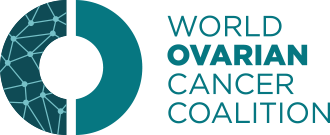
 By: Tristan Bilash (he/him/human)
By: Tristan Bilash (he/him/human)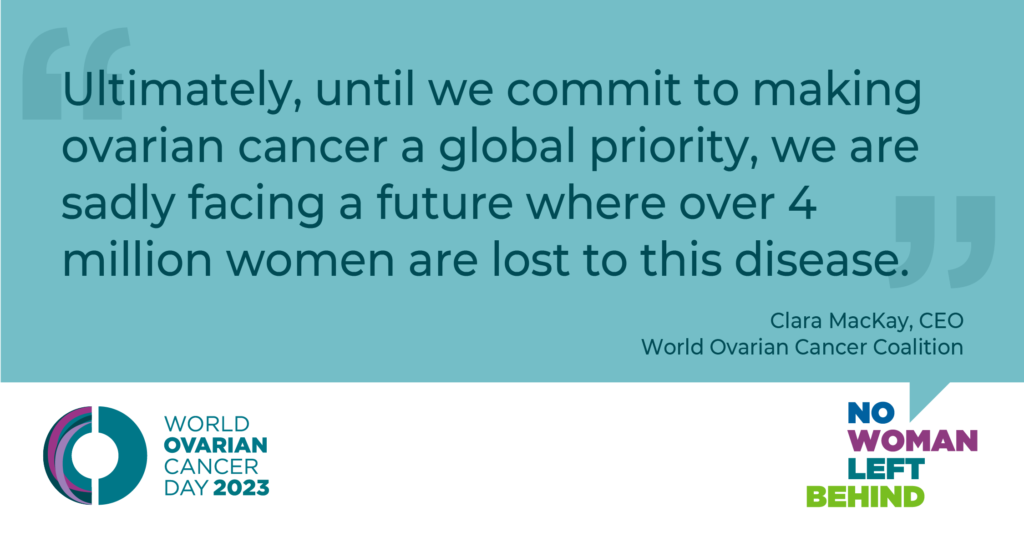 As a companion to the Every Woman Study™, the Coalition is also embarking on another critical piece of work, a Cost-of-Illness Study. In the hope of solidifying the case for urgent change, the Coalition will look at the economic and societal costs of ovarian cancer in 11 countries, representing high- to low-income settings. The Study will also shed light on the impact that positive changes to diagnosis and treatment of the disease could make. Attending this year’s SGO Conference, Clara MacKay, CEO of the Coalition says of this Study, “Combined with the patient experience evidence we are generating with the Every Woman Study™: Low- and Middle-Income Edition, it is our hope that these two Studies will help us identify concrete priorities for a global plan of action that will be endorsed by the international community. Ultimately, until we commit to making this disease a global priority, we are sadly facing a future where over 4 million women are lost to this disease, and where women across all economies face a chasm of disparities and poor outcomes.”
As a companion to the Every Woman Study™, the Coalition is also embarking on another critical piece of work, a Cost-of-Illness Study. In the hope of solidifying the case for urgent change, the Coalition will look at the economic and societal costs of ovarian cancer in 11 countries, representing high- to low-income settings. The Study will also shed light on the impact that positive changes to diagnosis and treatment of the disease could make. Attending this year’s SGO Conference, Clara MacKay, CEO of the Coalition says of this Study, “Combined with the patient experience evidence we are generating with the Every Woman Study™: Low- and Middle-Income Edition, it is our hope that these two Studies will help us identify concrete priorities for a global plan of action that will be endorsed by the international community. Ultimately, until we commit to making this disease a global priority, we are sadly facing a future where over 4 million women are lost to this disease, and where women across all economies face a chasm of disparities and poor outcomes.”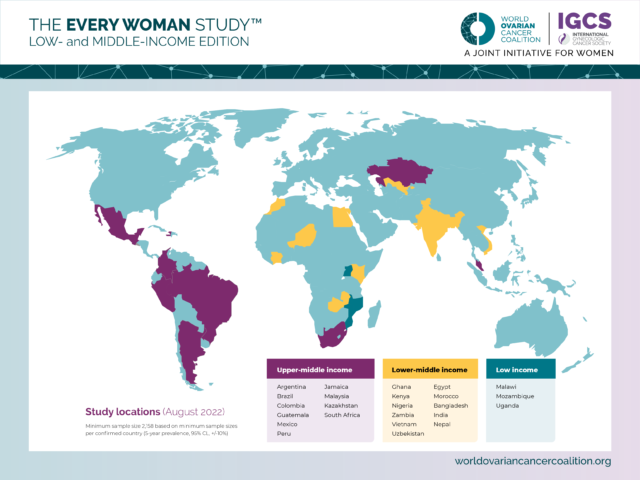
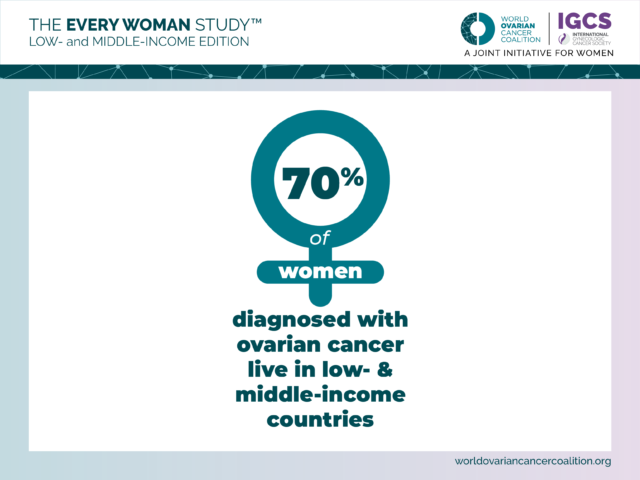
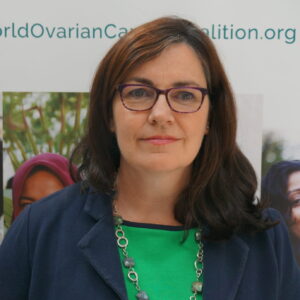


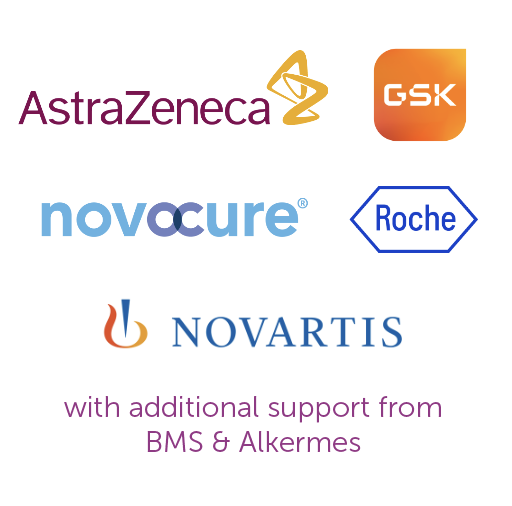
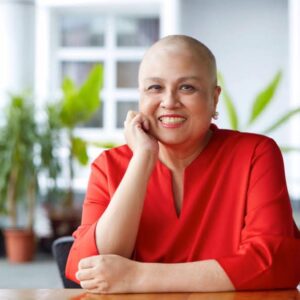 Last week we shared the very sad news of Celina May’s passing with The Every Woman Study™️ Oversight Committee. Celina was a part of this dedicated group of international doctors and patient advocates that is overseeing the largest ever study of the experiences of women with ovarian cancer in low- and middle-income countries. Response to the news about Celina from our colleagues on the Committee was immediate and heartfelt.
Last week we shared the very sad news of Celina May’s passing with The Every Woman Study™️ Oversight Committee. Celina was a part of this dedicated group of international doctors and patient advocates that is overseeing the largest ever study of the experiences of women with ovarian cancer in low- and middle-income countries. Response to the news about Celina from our colleagues on the Committee was immediate and heartfelt.